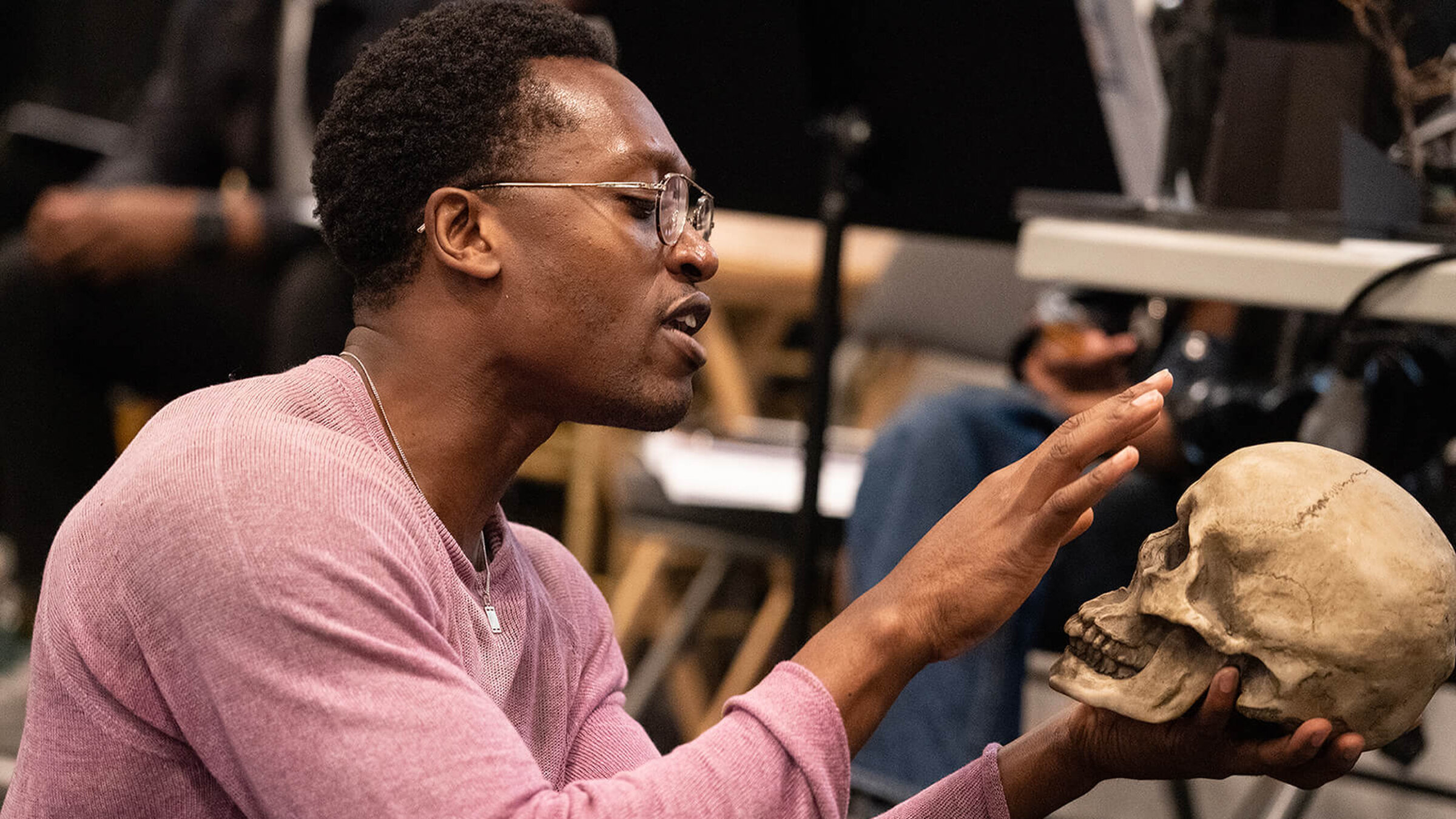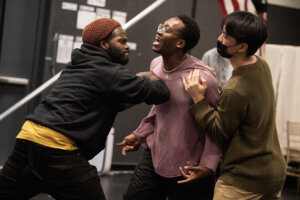How a Jewish scholar became the Shakespeare whisperer helping to make ‘Hamlet’ relevant to our times
James Shapiro first encountered Shakespeare in the classroom, but that’s not where he learned to love the Bard

Ato Blankson-Wood rehearses the title role in Hamlet, directed by Kenny Leon for Central Park’s Shakespeare in the Park. Photo by Joan Marcus
The other day, I went up to Columbia University to meet a nice Jewish boy from Brooklyn who attended the Yeshiva of Flatbush and Midwood High School and grew up to become one of the world’s great Shakespeare scholars.
His name is James Shapiro, and he’s an author and an English professor at Columbia University, where he has taught since 1985. He is also the Shakespeare scholar in residence at New York’s Public Theater, where he is currently consulting on this summer’s Shakespeare in the Park production of Hamlet.
Sitting in his book-lined office in Philosophy Hall at Columbia, Shapiro, 67, told me that his Jewishness had given him a special outlook on Shakespeare.
“The second book I wrote, my tenure book as they call it, was Shakespeare and the Jews,” he said. “I had a senior Jewish colleague, who’s no longer with us, who came down the hall and just begged me not to write this book. ‘You just don’t want to draw attention to your Jewishness,’ he said.”
After Shapiro received tenure, he says, he was “ given the freedom to write books, teach great Columbia students and advise productions — especially The Merchant of Venice, which has been always fraught for the Jewish community.”
So how should Jews approach Merchant — and not just Merchant, but all Shakespeare? After all, Shakespeare lived in a time of intense Jew hatred, and several other Shakespeare plays contain uncomplimentary references to Jews, among them the witches’ brew in Macbeth, and its “liver of blaspheming Jew.”
“In the Shakespeare world now, there are two schools,” Shapiro said. “Those who think we should not teach Othello, or The Merchant, because they offend sensibilities, they trigger feelings of unsafeness, or whatever the latest word is. I’m a member of the opposing school, which is if it doesn’t lead to violence, it’s crucial to stage these plays. They’re canaries in coal mines that tell us how Jews are thought of in the larger non-Jewish community. And I need to know that. And every time there’s a production of The Merchant of Venice, I have a better feel for what is out there.

“The most memorable production of The Merchant I’ve ever seen was at the Cameri Theater in Tel Aviv in 1995 when Shylock was played as a secular Jewish businessman — it was all in Hebrew — and he becomes radicalized and becomes, if you will, a violent Orthodox Zionist settler type, spraying his enemies onstage with an imaginary Uzi. It was a very powerful production that picked up something in the air. And a few months later, in November of that year, Yitzhak Rabin was gunned down by a man whose values were very proximate to those of that transformed Shylock. I’m interested in what plays can do to tell me what reading The New York Times or Haaretz or The Forward cannot.”
So how did this Yeshiva boy become a renowned Shakespeare scholar? It didn’t begin in the classroom.
In the ninth grade, his class read Romeo and Juliet “and I didn’t understand it at all,” Shapiro said. “I didn’t even get the obscene bits that my classmates seemed to get. And I swore I would never take another Shakespeare class again unless forced to.”
He had gone from Flatbush Yeshiva “in my earliest grades to East Midwood [Hebrew] Day School,” Shapiro recalled. “I wasn’t doing particularly well in Flatbush, which my grandfather had helped found and my mom taught at. My dad was a Hebrew educator as well. So my folks moved me to East Midwood. And after I finished eighth grade I had to choose between going to Flatbush Yeshiva or public schools. I decided I’d go to East Midwood for basically two days a week Talmud Torah but I would go into the public school system. And my first year was ninth grade at the annex of Midwood High school.”
It was at Midwood High that he encountered Romeo and Juliet. A few years later, he said, he rediscovered Shakespeare, but in the theater, not the classroom — on the stage, not the page.
After Midwood, he was admitted to Columbia College of Columbia University, “and I never took a Shakespeare course even though its Shakespeare professors were legendary. During the summers I’d hold down some job. I’d quit August, fly to London,” he said.

“I’d sleep in youth hostels and see a play with a student discount for 50 pence a day. And matinees I’d see two more plays that week. Only Shakespeare. Stoppard when there was a Stoppard play. But otherwise only Shakespeare. So by the end of my three or four weeks, however long the money held out, I’d seen 25-30 plays of Shakespeare. And I went back every year. It was like a drug. And that was my Shakespeare education. It was in the theater rather than in the study. So though we’re sitting in a room lined with books, this came much later in my career.”
He got his master’s at Columbia and his Ph.D. at the University of Chicago. His books include 1599: A Year in the Life of Shakespeare, which won the Samuel Johnson Prize (now called the Bailie Gifford Prize for nonfiction) in 2006.
What does Shapiro do as the Public Theater’s Shakespeare scholar and Hamlet consultant?
“It changes,” he said. “I’ve been working for the Public Theater for a decade. And Oskar Eustis, who runs it, invited me in because he wasn’t afraid to have a scholar in the room. Mind you, it’s extremely unusual to bring in a scholar. Scholars and actors are cats and dogs. We tend to talk past each other. Some directors are more welcoming than others. I often help a director find, choose, edit, cut a text. I’m good at that. I’m a butcher of Shakespeare. I wouldn’t want anyone to have to sit through a four-hour production of Hamlet. Even in Shakespeare’s day, they weren’t four hours. But there are so-called purists who think that’s what it ought to be.
“The director in this case, Kenny Leon, is a leading Black director, two plays on Broadway this year (Ohio State Murders, Topdog/Underdog). We worked together on Much Ado About Nothing pre-pandemic in the park. I love Kenny. We’re the same age. He grew up in the South, in a Black environment in Georgia. I grew up in Brooklyn, in a Jewish environment. Tremendous mutual respect. Kenny gives me more freedom to express my views, I think from a white perspective in a largely Black production — but not exclusively. Polonius’s family is a white family, the gravedigger is white.”
“I helped them with the cut, helped talk about the play, which is something I’ve lived with for my entire adult life,” he said. “I’m able to share insights into their characters with them. I’ve seen probably 25 productions of it. And I share what I know and what I think and sometimes it’s helpful and sometimes it’s not.”
This production is set in Atlanta, Georgia, in the recent past and features, Shapiro said, “the Black community and a young Black man dealing with grief, and with a society that’s undergoing all the pressures that we all experience. It’s just opening up for me — I know this play, I love this play. But it opens up for me things that I had not seen in it.”
“It’s been as thrilling a production as I’ve ever worked on,” Shapiro said. “It’s going to help explain not just to me but to the maybe 80,000 people who get to see it what’s going on in the world that’s only at the periphery of their understanding.”
Looking at the set in the Delacorte Theater in Central Park, “you’ll see symbolically represented the kind of breakdown post-pandemic,” Shapiro said. “There’s litter. The tiling is broken. When the play says there’s something rotten, and people are trying to navigate in America, where racial divisions, where political divisions are so deep, and increasingly unbridgeable, it’s up to playwrights and directors to confront that.
“Most can’t do it very well. Kenny Leon has a gift. For me it’s been a great experience watching him illuminate what is only partly clear to me. There’s only so much you can pick up reading The New York Times. You have to go to the theater to feel a sense of both despair and hopefulness. Which is what Hamlet is about.”
Hamlet runs through Aug. 6 at the Delacorte Theater in Central Park.
A message from our Publisher & CEO Rachel Fishman Feddersen

I hope you appreciated this article. Before you go, I’d like to ask you to please support the Forward’s award-winning, nonprofit journalism during this critical time.
We’ve set a goal to raise $260,000 by December 31. That’s an ambitious goal, but one that will give us the resources we need to invest in the high quality news, opinion, analysis and cultural coverage that isn’t available anywhere else.
If you feel inspired to make an impact, now is the time to give something back. Join us as a member at your most generous level.
— Rachel Fishman Feddersen, Publisher and CEO























